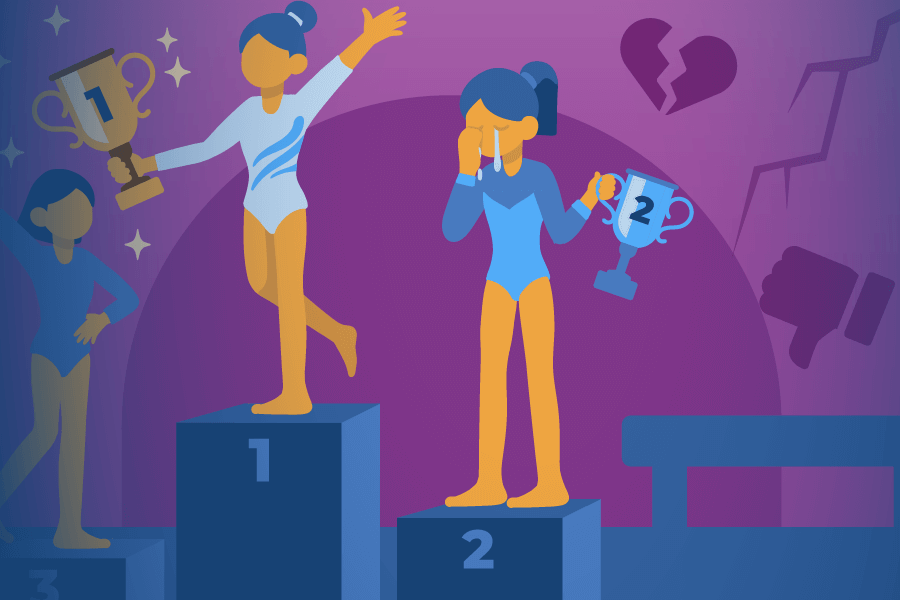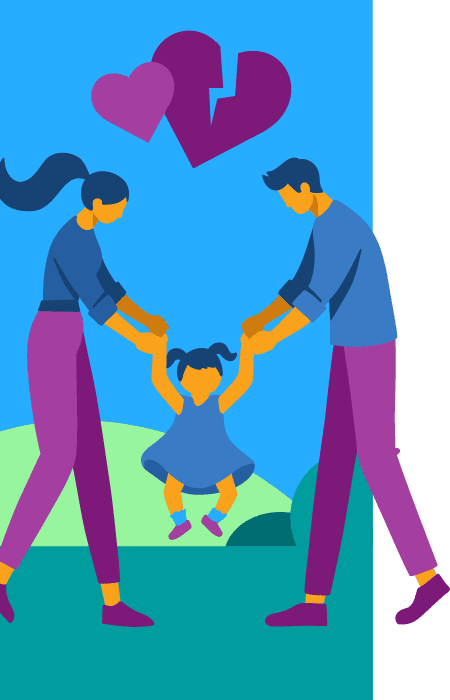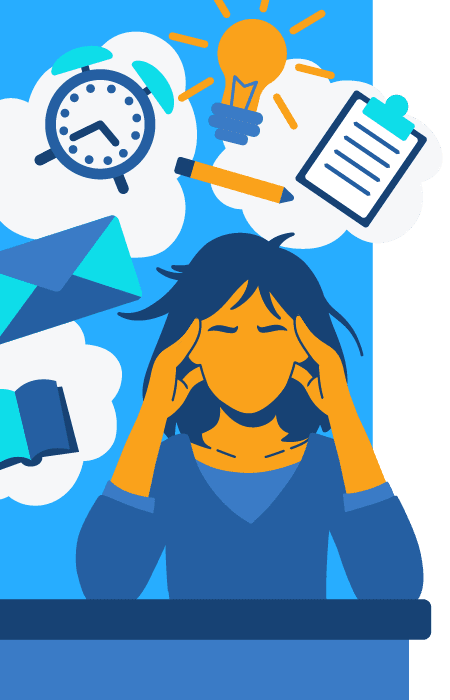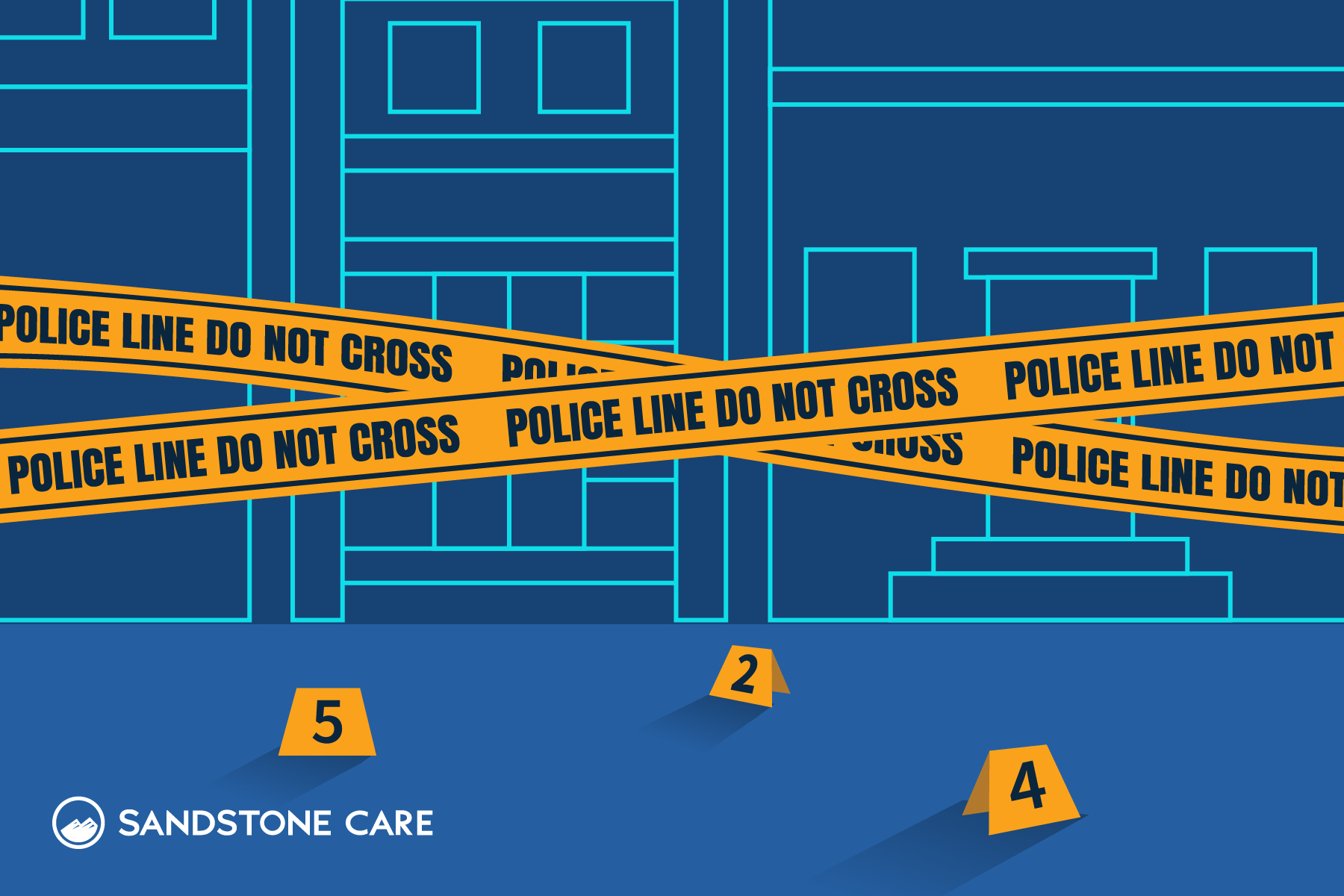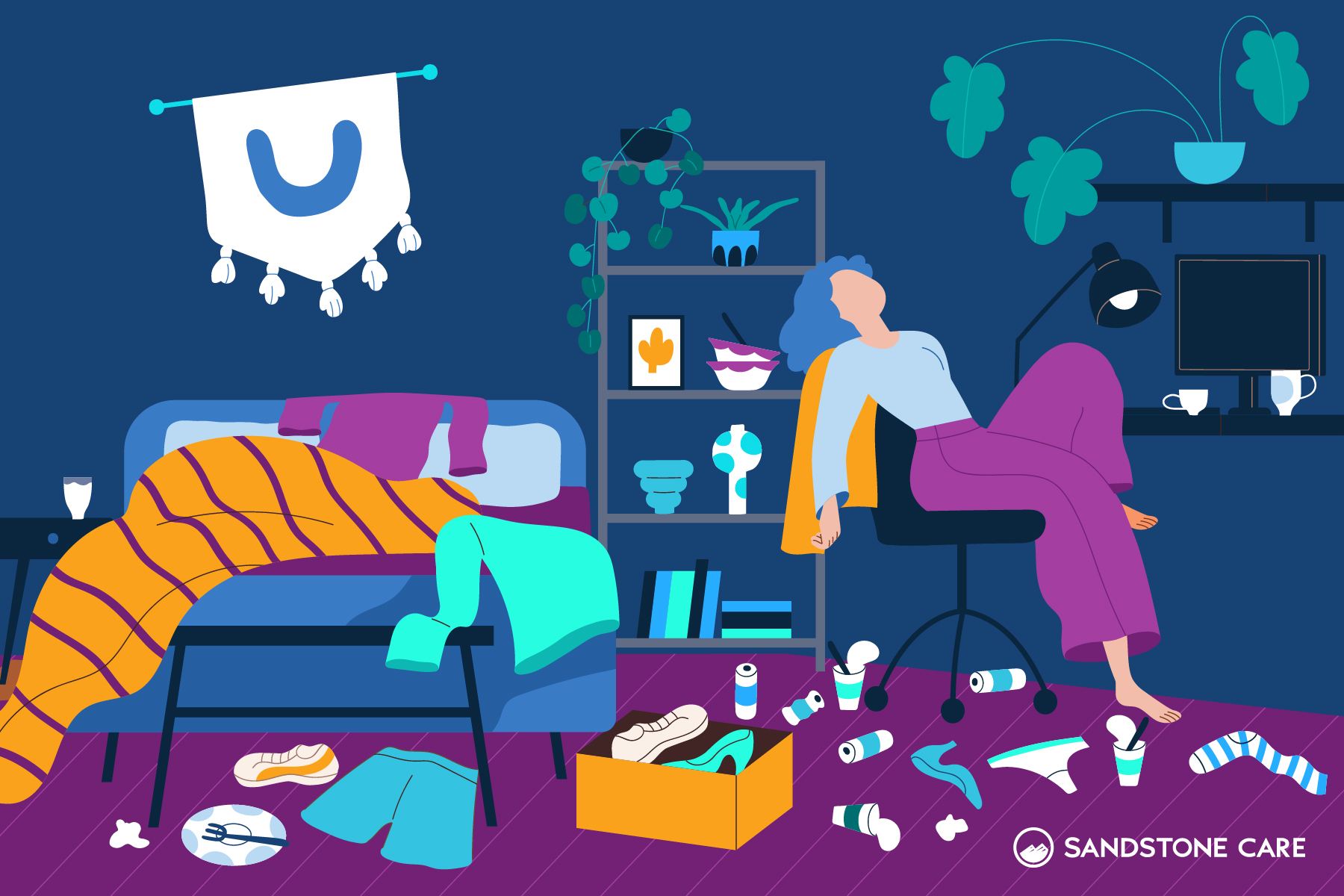Rejection Sensitive Dysphoria (RSD) Meaning
What Is Rejection Sensitive Dysphoria?
Rejection Sensitive Dysphoria (RSD) causes strong emotional reactions to being rejected or criticized, even if it’s only a slight or imagined rejection.
It’s often seen in people with ADHD, where it’s considered more of a symptom than a standalone diagnosis.
People with RSD feel the impact of rejection more strongly than others, which can affect how they focus and manage tasks.
Research shows that people with high rejection sensitivity often struggle to keep attention on goals when facing social threats or criticism.
In simple terms, their fear of rejection can get in the way of focusing on other important things, making everyday challenges feel even tougher.
Is Rejection Sensitive Dysphoria Real?
Yes, the experiences people have with Rejection Sensitive Dysphoria are very real, but it’s not recognized as a disorder on its own.
RSD isn’t listed as a condition in the DSM-5, which is the main guide that mental health professionals use to classify mental health disorders.
For this reason, it’s referred to as “dysphoria” rather than a disorder.
In simple terms, “dysphoria” means a state of intense emotional pain or discomfort.
For those with RSD, this distress often comes from feeling rejected or criticized, even if that rejection is small or imagined.
What Is an RSD Meltdown?
An RSD meltdown happens when someone with Rejection Sensitive Dysphoria feels so hurt by rejection or criticism that it becomes hard for them to do anything.
Even small comments or misunderstandings can trigger extreme feelings of anger, sadness, or frustration, sometimes causing them to cry or shut down.
During a meltdown, it can be difficult for them to think clearly or feel able to go to work, school, or social events.
The intense emotions from rejection sensitivity often leave them feeling stuck or ashamed, making it hard to move forward or face others afterward.
How Long Do RSD Episodes Last?
RSD episodes can last from a few hours to several days after feeling rejected.
If someone with RSD goes through multiple experiences of thinking that they are being rejected by others, these feelings can build up and last even longer.
There isn’t a lot of research on how long RSD episodes last, so this can look different from person to person.
What Are the Stages of RSD?
The stages of RSD are:
- Trigger
Something happens that feels like rejection or criticism, like a friend canceling plans or a teacher pointing out a mistake. - Emotional Reaction
Strong emotions flood in, like sadness, anger, or embarrassment. - Self-Criticism
They may start blaming themselves, thinking things like, “I always mess up,” or, “No one likes me.” - Avoidance or Withdrawal
To escape the feelings, they might avoid social situations or isolate themselves, like skipping school, work, or social events to avoid facing people. - Recovery
Over time, the intense feelings fade, and they may feel more able to move on and reconnect with others.
Rejection Sensitive Dysphoria Examples
What Is an Example of Rejection Sensitivity?
An example of rejection sensitivity may be when a teacher or boss gives feedback on an assignment.
Even if it’s constructive, someone with RSD might feel hurt, thinking, “I did a terrible job” or, “They don’t like me.”
As a result of this social rejection, they may avoid similar tasks or feel too afraid to volunteer in the future.
What Does an RSD Episode Look Like?
To loved ones, an RSD episode can look like a big overreaction to a small issue. A rejection sensitive person may get angry easily, avoid calls and texts for long periods of time, or miss social events after they feel criticized.
For example, after a minor disagreement, someone with RSD might break down in tears, pull away from others, or start doubting themselves.
They may say things like, “I knew you hated me,” or “no one wants me there anyway.”
This can be confusing for friends or family, who may wonder why it seems so overwhelming.
You might notice them avoiding social opportunities, struggling to bounce back from even gentle feedback, or reacting strongly to things that seem small.
What Does RSD Look Like in Adults?
In adults with RSD, even small signs of rejection—like a friend not replying to a text—can cause serious emotional pain.
They may use the event to confirm doubts they have about their self esteem.
This usually shows in negative self-talk, such as “I knew it, they hate me,” or “I am the worst.”
Sometimes, adults with RSD will purposefully sabotage projects or relationships so that they feel like they are in control of the rejection, since they believe it is guaranteed to happen eventually.
Causes of Rejection Sensitive Dysphoria
What Causes Rejection Sensitive Dysphoria?
Rejection Sensitive Dysphoria (RSD) doesn’t have one clear cause, but certain things, like mental health conditions or being neglected at a young age, can make it more common.
Many people with ADHD experience RSD because their brains process emotions differently.
The ADHD brain often has difficulty with emotional regulation, which makes it harder to manage strong feelings.
Early life experiences, like feeling left out by friends or being frequently criticized, may also increase sensitivity to rejection.
For example, if someone grows up under a strict parenting style that made them feel like they could never do anything right, they may be quicker to assume that others are criticizing them the way that their parents did.
People who’ve gone through bullying or social isolation as kids or teenagers may feel even more hurt by rejection as adults because it triggers old memories and fears.
These experience can make some people with RSD hyper-independent to try to avoid opportunities where they might be vulnerable enough to experience rejection.
What Triggers Rejection Sensitive Dysphoria?
Common triggers of RSD include:
- Receiving critical feedback at school or work
- Being excluded from social events or plans
- Feeling ignored or not responded to in conversations
- Experiencing a breakup or the end of a friendship
- Facing moments of conflict or disagreement
These situations can cause intense emotional reactions in people with RSD, often leading to feelings of sadness, anger, or low self-esteem.
Can Rejection Sensitive Dysphoria Be Caused by Trauma?
Yes, trauma can sometimes lead to Rejection Sensitive Dysphoria (RSD).
Early painful experiences—like childhood abuse, neglect, bullying, or high pressure parenting —can make someone more sensitive to rejection throughout the rest of their lives.
While trauma isn’t the only cause of RSD, people who went through social isolation early in life often feel rejection more strongly as adults.
What Childhood Trauma Causes Fear of Rejection?
Children who feel neglected, criticized, or unsupported by their parents may grow up constantly worrying about being rejected by others.
Kids who are bullied, excluded from friend groups, or made to feel different often develop a deep fear of rejection.
High-pressure, strict parenting styles can sometimes cause children to become terrified of not being “worthy” of love or attention.
This trauma can lead them to be hypersensitive to rejection, especially if this behavior has been happening for multiple generations.
Children with unique traits—like having a disability, belonging to a minority group, or simply acting or looking different from their peers—can be left out of social groups at a young age.
These early experiences can lead to a strong fear of rejection that often sticks around into adulthood, making social situations feel more challenging or risky.
Symptoms of Rejection Sensitive Dysphoria
What Are the Symptoms of Rejection Sensitive Dysphoria?
RSD symptoms include:
- Overapologizing
- Emotional meltdowns over small rejections
- Low self-esteem and frequent negative thoughts about themselves
- Perfectionism
- Avoiding social situations or challenges out of fear of judgment
- Constant need for reassurance
- Overreacting to minor conflicts or misunderstandings
- Getting stuck thinking about past mistakes
- Impulsive reactions to criticism, like lashing out or shutting down
These symptoms can look similar to other mental health conditions, like anxiety disorders. Since RSD shares a lot of symptoms with social anxiety, it is important to talk to a healthcare provider to ensure that the right root cause is being treated.
How Do You Know If You Have Rejection-Sensitive Dysphoria?
To see if you might have Rejection Sensitive Dysphoria (RSD), consider these questions:
- Do you often ask for reassurance, like checking if someone’s upset with you or if you did a good job?
- Do I think of myself as a “people pleaser”?
- Do you avoid social interactions because you’re afraid of being judged or left out?
- Do you often replay events in your mind, especially times when you felt left out or misunderstood?
- Do you avoid situations where you might get feedback, like looking at posted grades or meeting with your boss?
If these questions sound familiar, you may be experiencing RSD.
Because RSD is common in people with ADHD, talking to a healthcare provider about an ADHD assessment could give you more insight.
What Does RSD Physically Feel Like?
For many people, Rejection Sensitive Dysphoria (RSD) causes physical symptoms like:
- Racing heart
- Tight chest
- Heightened blood pressure
- Stomach pain or nausea
- Sweating or feeling flushed
- Headaches
These symptoms can feel overwhelming, especially for people with ADHD or social anxiety, who may already have a hard time managing their nervous system’s response to negative emotions. People with RSD may be more prone to panic attacks as well.
How Can You Tell If Someone Has RSD?
To recognize if someone might have Rejection Sensitive Dysphoria (RSD), look for signs like these:
- Strong reactions to small feedback
- Avoiding events or group settings
- Over-apologizing
- Negative self-talk
To loved ones, these behaviors might look like they’re overreacting, but for someone with RSD, they stem from real emotional pain and a constant fear of rejection.
Does Rejection Sensitive Dysphoria Get Worse Over Time?
Yes, Rejection Sensitive Dysphoria (RSD) can get worse if left untreated.
Over time, people with RSD may feel stronger emotional reactions and low self-esteem from repeated social rejection or criticism.
Since RSD can make relationships difficult, many people with RSD will take the break-ups and strained friendships as evidence that they are always going to be rejected.
They often feel ashamed of their reactions to rejection, wondering why they can’t “react like everyone else” to small disagreements. This can make it difficult to build healthy connections, and people with RSD often find themselves in abusive or toxic relationships where they are frequently criticized.
This cycle of broken relationships and fear of rejection can make symptoms of RSD worse over time.
Is Rejection Sensitive Dysphoria Fight or Flight?
Rejection Sensitive Dysphoria (RSD) often triggers both “fight or flight” responses.
When someone with RSD feels criticized or rejected, their nervous system can respond as if they’re facing a real threat.
This reaction may lead to either “fight” responses, like arguing or defending themselves, or “flight” responses, like avoiding the situation altogether.
Overall, people with RSD may tend quicker to a “flight” response as they try to avoid situations where they might end up being criticized.
Effects of RSD
How Does RSD Affect Relationships?
Rejection Sensitive Dysphoria (RSD) can make relationships hard. People with RSD often worry so much about being rejected that they might expect it to always happen, even when they aren’t being rejected.
This can lead to self-sabotage or pulling away from loved ones.
They may avoid bringing up issues, worry about being judged, or react strongly to small things, like a change in tone or a missed message.
These intense reactions can be confusing for friends, family, or partners, who might not understand why things feel so serious.
What Is RSD in Dating?
Rejection Sensitive Dysphoria (RSD) in dating can feel intense and stressful, and it often leads to difficult or toxic relationships.
People with RSD may worry constantly about being judged or rejected, which can lead to strong emotional responses even to small things.
For example, if a partner doesn’t reply to a message right away, someone with RSD might spiral with thoughts about having done something wrong.
This can lead to behaviors that seem “overbearing,” like needing reassurance over and over again or constantly checking if everything is okay.
It can also be difficult to get into relationships in the first place. For example, after meeting someone for the first time, they may be slow to respond to phone calls or have to cancel plans. Someone with RSD may be quick to assume that that means they are being rejected, so they abandon the relationship before it has even started.
What Are the Psychological Effects of Rejection?
The psychological effects of rejection include anxiety, sadness, anger, and low self-esteem, especially for people with Rejection Sensitive Dysphoria (RSD) or ADHD.
Rejection often brings a deep sense of emotional pain and can even interfere with executive function—skills like focusing, organizing, and making decisions.
When rejection hits hard, it can be tough to think clearly or stay on task because that emotional pain takes over.
To cope, some people react impulsively with emotional outbursts, like lashing out or over-explaining to regain a sense of control.
Others might withdraw and avoid social situations to protect themselves from more hurt.
Both impulsivity and withdrawing are ways of trying to handle the helplessness from the experience of rejection.
What Happens to the Brain After Rejection?
Rejection activates parts of the brain that respond to physical pain, like the dorsal anterior cingulate cortex and the anterior insula.
This is why social rejection can sometimes feel like a type of physical injury—it’s wired into our brains.
For people with Rejection Sensitive Dysphoria (RSD), borderline personality disorder, or ADHD (attention deficit hyperactivity disorder), this reaction may be even stronger due to their nervous system’s sensitivity to emotional dysregulation.
This “social pain” response acts like a kind of alarm, warning us that we might be losing connection or social acceptance.
ADHD & RSD
What Does RSD in ADHD Look Like?
For people with ADHD, Rejection Sensitive Dysphoria (RSD) can make even small criticisms feel like full-blown rejections, and ADHD symptoms, like hyperfixation, can make it even harder to brush these off.
ADHD affects emotional regulation and impulse control, which makes it difficult for someone with ADHD to use self-regulation skills to help them handle feelings of rejection.
For example, if they think a friend might be annoyed because they aren’t replying to their texts, they might instantly feel hurt or panicked.
They may send multiple apology texts or over-explain, desperate to fix things.
Instead of being able to move on, they can get stuck replaying the situation in their head, thinking, “I always mess things up,” or wondering if they’ve ruined the friendship.
Because ADHD makes it hard to shift focus, they may struggle to pay attention to anything else—like school or work—until they feel like the situation is resolved.
Can You Have Rejection Sensitive Dysphoria Without ADHD?
Yes, you can experience Rejection Sensitive Dysphoria (RSD) even if you don’t have ADHD.
While RSD is common among people with ADHD because of shared challenges with emotional regulation and sensitivity to social rejection, RSD can show up in others, too.
People with different mental health conditions, such as borderline personality disorder or mood disorders, may also experience intense reactions to rejection.
What ADHD Medication Is Best for RSD?
There isn’t a specific medication just for Rejection Sensitive Dysphoria (RSD), but some ADHD medications can help manage RSD symptoms by improving emotional regulation.
Stimulant medications like Ritalin or methylphenidate, as well as non-stimulants like guanfacine and clonidine, can help calm the nervous system, making emotional responses less intense.
These medications may also support executive function, helping people with RSD feel more in control of their reactions.
Antidepressants, such as SSRIs, may help balance mood and reduce emotional pain from perceived rejection by regulating chemicals like serotonin in the brain.
A healthcare provider or psychiatrist can help find the right treatment options, often combining medication with cognitive behavioral therapy (CBT) or psychotherapy for the best results.
How Do You Fix ADHD RSD?
While there’s no instant “fix” for Rejection Sensitive Dysphoria (RSD) in ADHD, treatments include:
- Medication – Stimulant medications, non-stimulants like guanfacine or clonidine
- Therapy – Cognitive Behavioral Therapy (CBT) is effective in addressing negative self-talk and building emotional regulation skills.
- Mindfulness and self-care practices – Practicing mindfulness, journaling, or even simple breathing exercises can reduce emotional dysregulation.
- Building support systems – Supportive friends, family, or support groups can provide understanding and reassurance, reducing the fear of social rejection.
How to Deal with Rejection Sensitive Dysphoria
What to Do During an RSD Episode?
When an RSD episode hits, these steps can help you feel more grounded:
- Take a moment to breathe and take a step back.
Go ahead and delete that wall of text for now. Slow, deep breaths can help calm your body and give you a chance to clear your mind. - Challenge those thoughts
Try saying to yourself, “Is there another way to look at this?”
- Talk to someone you trust
Reach out to a friend or loved one who can offer some reassurance and help you see things from a different perspective. - Do something comforting
Listen to a favorite song, go for a walk, or write down your thoughts. Shifting focus can help calm intense emotions.
How to Talk to Someone with Rejection-Sensitive Dysphoria?
When talking to someone with Rejection Sensitive Dysphoria (RSD), a gentle, understanding approach helps them feel secure.
People with RSD are often sensitive to criticism, so reassuring them with simple phrases like, “I’m here for you,” or, “I understand why this feels hard,” can make a big difference.
Validating their feelings is also important. Even if the issue seems minor to you, acknowledging their experience shows you’re listening.
When offering feedback, keep it kind and constructive—try focusing on positives first, saying something like, “This part is great, and here’s an idea to make it even better.”
How Do I Explain RSD to My Partner?
To explain Rejection Sensitive Dysphoria (RSD) to your partner, try saying something like, “Sometimes, even small comments feel like big criticisms to me. I know it might not seem like a big deal, but it can really hit me hard.”
You might add, “When I feel criticized, I might need a little time to process. It helps me a lot when you’re patient or reassure me.” Sharing this can help them understand and support you better.
How to Deal with a Spouse with Rejection-Sensitive Dysphoria?
When your spouse has Rejection Sensitive Dysphoria (RSD), healthy boundaries are key.
It’s important to address issues honestly, but be mindful that they might take things more personally.
You could say something like, “I’m sharing this because I want us to be stronger, not because I’m pulling away.”
This helps them understand you’re not rejecting them, just working on the relationship.
Rejection Sensitive Dysphoria Treatment
What Is the Best Treatment for Rejection Sensitive Dysphoria?
Treating Rejection Sensitive Dysphoria (RSD) often works best with both therapy and medication.
Cognitive Behavioral Therapy (CBT) helps people identify and change negative thoughts, making emotional reactions easier to manage. Medications like stimulants, guanfacine, or clonidine can help with stability, and sometimes antidepressants are also used to reduce sensitivity.
Getting diagnosed for any underlying issues, like ADHD or other mental health conditions, can help make sure that treatment is targeting the root cause of RSD.
Does RSD Ever Go Away?
Rejection Sensitive Dysphoria (RSD) may not fully go away, but with the right treatments and coping strategies, the intensity of symptoms can lessen over time.
How to Heal RSD?
Healing from RSD involves developing tools to handle rejection and criticism.
Therapists and support systems can help people with RSD to slowly and healthily feel more secure in their relationships and attachment style.
This may involve diving into other conditions someone with RSD has, such as managing symptoms of ADHD.
How to Stop Feeling Rejected in a Relationship?
To stop feeling rejected in a relationship, it is important to make sure that the relationship is healthy first, then you can focus on communicating things that may trigger feelings of rejection and find the best way to handle them together.
Let your partner know how certain actions affect you, and work together to create a sense of security.
For example, if delayed replies make you feel ignored, gently explain, “When I don’t hear back, I start to worry I did something wrong.”
This opens up space for your partner to understand your needs and adjust where possible.
Working together to build security might also mean creating small check-ins, like a quick text during busy days or reassurance after difficult conversations.
These small gestures can make a big difference in helping you feel connected and valued.
What Is the Best Therapy for Rejection-Sensitive Dysphoria?
Cognitive Behavioral Therapy (CBT) is often the most recommended therapy for RSD, since it teaches people how to interrupt the spiral of thoughts that make them feel rejected.
CBT can address negative self-talk, rumination, and impulsive reactions, making emotional responses easier to manage.
For some, Dialectical Behavior Therapy (DBT) also provides valuable tools for managing intense emotions.
Working with a therapist who understands RSD can help you develop the skills you need to feel more secure and cope with feelings of rejection in a healthier way.

